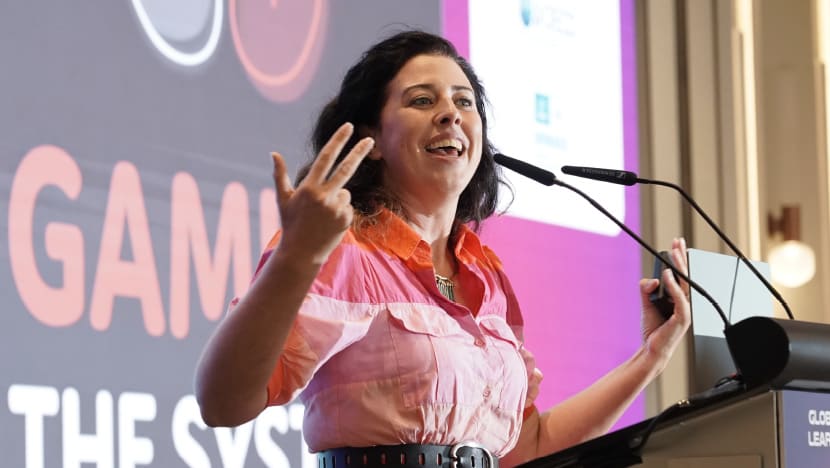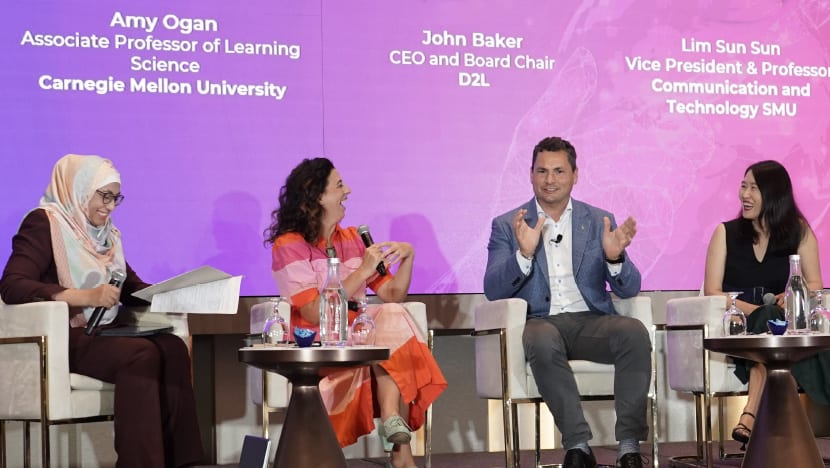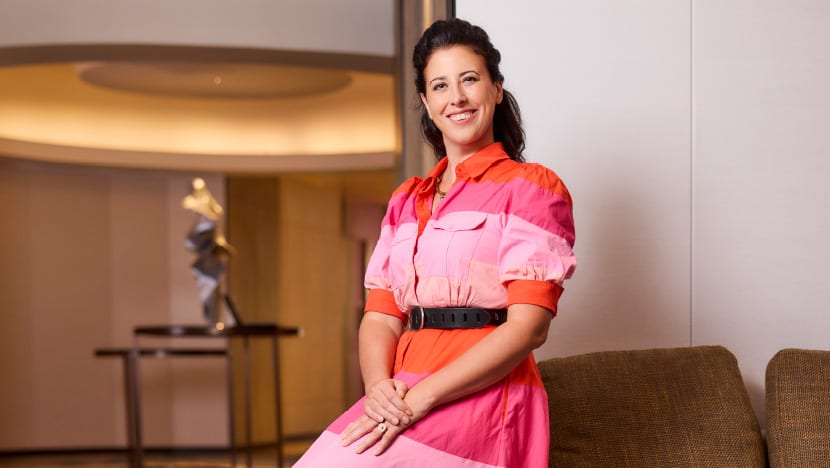As artificial intelligence (AI) becomes increasingly integrated into learning, it’s important to move beyond the hype and develop systems that truly enhance and support the learning experience.
At the 2024 Global Lifelong Learning Summit (GLLS), Dr Amy Ogan – an educational technologist and associate professor of learning science at Carnegie Mellon University – shared insights into how AI can be developed to function as part of a human-AI teaching team, rather than as a replacement for human teachers.
Held from Oct 1 to Oct 2 at the Grand Copthorne Waterfront, GLLS was jointly organised by the Institute for Adult Learning (IAL) and SkillsFuture Singapore. The dynamic event saw over 400 industry experts, policymakers and tech leaders convene to exchange ideas on the transformative impact of AI on learning and human potential.
Global Lifelong Learning Summit 2024 served as a dynamic platform to explore the intersection of AI, lifelong learning and human
In her keynote speech, Dr Ogan highlighted three key areas for consideration: How much should AI know, how much authority AI should have in learning environments, and how AI’s role might affect the teacher’s own capacity to care for their students.
According to Dr Ogan, these reflections will steer the development of AI systems that benefit all, enhancing education while preserving the essential human elements.

HOW MUCH SHOULD AI KNOW?
AI systems can be designed to encompass vast knowledge across multiple subjects, far beyond the expertise of any single teacher. However, as Dr Ogan pointed out, this raises significant concerns about the extent to which AI should be omniscient.
While AI systems can answer detailed, subject-specific questions and help students with problem-solving, Dr Ogan cautioned that the technology is not infallible — particularly when it comes to more nuanced challenges.
In her speech, Dr Ogan illustrated AI’s limitations by recounting how an AI system attempted to help a student solve a complex math problem. Despite its confidence, the AI produced an incorrect solution, underscoring the technology’s potential for mistakes. “AI systems still have hallucinations; they make things up,” she said, emphasising the need for caution when relying on such technology.

Another issue highlighted by Dr Ogan is the potential for students to trust AI more than their human teachers. Studies have shown that after AI provides several correct answers, students tend to increasingly rely on it, which can lead to complacency and diminished critical thinking.
To address this, Dr Ogan suggested that AI systems be designed to function more like “teachable agents”, models that know less than the student and rely on the learner to fill in the gaps. This approach encourages students to take ownership in teaching the AI, thereby reinforcing their understanding of the material.
“Imagine if your AI asks questions like a student and has a limited set of knowledge,” said Dr Ogan. “This concept, known as a ‘teachable agent’, has been explored in research-based systems for the last 20 years. The AI is programmed to act as though it knows less than the student, allowing the learner to teach the agent.” Not only does this reinforce the student’s own understanding, it also fosters deeper learning and engagement in the process.
HOW AI IS SHAPING THE FUTURE OF LEARNING
-
Streamlines administrative tasks, freeing teachers to focus more on student engagement
-
Enables rapid assessment and immediate feedback, improving learning outcomes
-
Helps students build critical skills like digital literacy, creativity and problem-solving
-
Personalises learning experiences, leading to better academic performance and adaptation to diverse needs
HOW MUCH AUTHORITY SHOULD AI HAVE?
Traditionally, teachers hold considerable authority in the classroom, from assigning grades and tracking progress to enforcing discipline. If AI systems were granted similar authority, it could fundamentally alter the dynamics of learning.
Dr Ogan warned of the dangers of over-relying on AI, citing the 2020 controversy in Scotland, where AI was used to assign exam grades during COVID-19. “With a shortage of reviewers to grade exams, the system turned to AI, which resulted in unfairly downgraded scores and sparked nationwide protests,” she explained. The backlash was so severe that the system was ultimately scrapped, and the grades were withdrawn, illustrating the risks of delegating too much control to AI without sufficient oversight.
While AI can assist with tasks like grading or monitoring student progress, Dr Ogan emphasised the importance of maintaining a balance, ensuring that teachers retain ultimate responsibility and oversight.

HOW MUCH SHOULD AI CARE?
One of the most powerful aspects of a teacher-student relationship is the personal connection and care a teacher provides. AI systems, while highly efficient, inherently lack genuine emotions.
Dr Ogan questioned whether AI systems should even attempt to simulate care, creating relationships with students that mimic human connections. While some AI systems are being designed to simulate emotional responses, Dr Ogan raised ethical concerns about how far this should go.
She pointed to “parasocial relationships”, where people form emotional bonds with media characters. While such relationships can create trust and engagement, they also run the risk of misleading students into believing that the AI truly cares about them.
For Dr Ogan, it’s clear that human teachers must retain their unique role. The ability to care deeply about a student’s success, offer personal encouragement and respond empathetically to their needs is something AI cannot – and should not – replace. Instead, AI should complement this human strength by handling administrative tasks or providing data-driven insights, allowing teachers to focus on what they do best.

THE SIGNIFICANCE OF AI IN LIFELONG LEARNING
Reflecting on the role that AI plays in education, Dr Ogan highlighted its potential to revolutionise the learning experience. “Educators can harness AI to enhance teaching strategies using AI-powered tools like tutoring systems and adaptive learning platforms, which offer real-time feedback to help students progress faster,” she said. She added that AI enables institutions and educators to analyse large volumes of learner data, providing insights that improve classroom teaching and learning outcomes while guiding student pathways and university-level trajectories.
This perspective aligns with IAL’s mission to promote lifelong learning by equipping educators and institutions with the necessary tools and insights to stay ahead in a rapidly changing environment.
Associate Professor (Practice) Yeo Li Pheow, executive director of IAL, said: “As Singapore’s National Centre of Excellence for Adult Learning, we are here to foster dialogue and collaboration, ensuring that as AI capabilities grow, our ability to leverage them for individual and societal benefit grows as well.”














